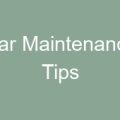Tire Maintenance Tips

Proper tire maintenance is important for safety and performance. Check tire pressure regularly, rotate tires for even wear, and inspect for damage. #tiremaintenance
Tire Maintenance Tips: Regular tire maintenance is crucial for optimum performance and safety. Proper tire inflation is essential for balanced wear and fuel efficiency. Check tire pressure monthly using a reliable gauge. Tire rotations should be done every 5,000-7,500 miles to promote even tread wear. Inspect tire tread depth regularly to ensure adequate traction and replace worn tires promptly. Wheel alignments should be performed annually or when experiencing steering issues. Balancing tires minimizes vibration and extends their lifespan. Avoid overloading the vehicle to prevent premature tire wear. Lastly, regular inspections of tire condition, including sidewalls, cuts, and bulges, are crucial for early detection of potential issues.
| Tire Pressure: Regularly check and maintain the recommended tire pressure for optimal performance. |
| Tread Depth: Check the tread depth regularly to ensure proper grip and traction. |
| Tire Rotation: Rotate your tires every 5,000 to 7,500 miles to ensure even wear. |
| Wheel Alignment: Get your wheels aligned to prevent uneven tire wear and improve handling. |
| Tire Balancing: Regularly balance your tires to minimize vibrations and extend tire life. |
- Tire Inspection: Inspect tires for any signs of damage or punctures regularly.
- Tire Storage: Store tires in a cool, dry place to prevent degradation.
- Tire Sidewall: Check sidewalls for cracks, bulges, or other abnormalities.
- Tire Rotation Pattern: Follow the recommended rotation pattern for your specific vehicle.
- Tire Replacement: Replace tires when they reach the minimum tread depth or show signs of excessive wear.
What are the best tire maintenance tips to ensure longevity and optimal performance?
To ensure longevity and optimal performance of your tires, there are several important maintenance tips to follow. Regularly check the tire pressure using a tire pressure gauge and inflate them to the recommended level. This helps prevent uneven wear and improves fuel efficiency. Additionally, inspect the tread depth periodically to ensure it meets the legal requirements and provides sufficient traction. Rotate your tires regularly to promote even wear and extend their lifespan. It is also crucial to maintain proper wheel alignment and balance to prevent uneven wear and vibrations. Lastly, keep an eye on any signs of damage, such as cuts, bulges, or punctures, and promptly address them to avoid tire failure.
How often should tire pressure be checked and what is the recommended level?
Regularly checking tire pressure is essential for optimal performance and safety. It is recommended to check the tire pressure at least once a month and before long trips. The recommended tire pressure can usually be found in the vehicle’s owner’s manual or on a sticker located on the driver’s side door jamb. It is important to inflate the tires to the recommended level, which may vary depending on the vehicle and tire type. Properly inflated tires not only enhance handling and braking but also contribute to better fuel efficiency.
Why is it important to maintain proper tread depth and how can it be measured?
Maintaining proper tread depth is crucial for ensuring adequate traction and handling on various road conditions. It can be measured using a simple tool called a tread depth gauge. Insert the gauge into the tire’s grooves and measure the depth. The legal minimum tread depth requirement typically ranges from 2/32 to 4/32 of an inch depending on the jurisdiction. Insufficient tread depth can increase the risk of hydroplaning, reduce traction on wet or snowy roads, and compromise braking performance. Therefore, it is important to replace tires with worn-out treads to maintain safety.
What is tire rotation and why is it necessary?
Tire rotation involves moving the tires from one position to another on the vehicle at regular intervals. It is necessary to promote even wear and extend the lifespan of the tires. The front tires tend to wear more quickly than the rear tires due to factors such as weight distribution and steering. By rotating the tires, the wear is distributed more evenly, resulting in longer-lasting tires and improved performance. Consult your vehicle’s owner’s manual or a professional technician for the recommended tire rotation pattern and frequency.
How does wheel alignment affect tire performance and when should it be checked?
Proper wheel alignment plays a crucial role in tire performance and overall vehicle handling. When the wheels are properly aligned, they are parallel to each other and perpendicular to the ground. This ensures even tire wear, optimal fuel efficiency, and improved vehicle stability. Wheel alignment should be checked whenever new tires are installed or if you notice signs of abnormal tire wear, such as uneven tread wear or the vehicle pulling to one side. Professional alignment checks and adjustments should be performed by trained technicians using specialized equipment.
What are the signs of tire damage and how should they be addressed?
It is important to regularly inspect your tires for signs of damage and address them promptly to avoid tire failure. Signs of tire damage include cuts, bulges, punctures, and sidewall cracks. If you notice any of these signs, it is recommended to have the tire inspected by a professional. In some cases, the tire may be repairable, but in others, replacement may be necessary. Ignoring tire damage can lead to blowouts or loss of control while driving, posing a serious safety risk.
How can tire maintenance contribute to better fuel efficiency?
Proper tire maintenance can significantly impact fuel efficiency. By keeping your tires properly inflated to the recommended level, you reduce rolling resistance, which in turn improves fuel efficiency. Underinflated tires can cause increased friction and energy loss, resulting in reduced gas mileage. Regularly checking and adjusting tire pressure can help maximize fuel economy and save money at the pump. Additionally, maintaining proper wheel alignment and balanced tires also contribute to better fuel efficiency.
What are the benefits of using winter tires during cold and snowy conditions?
Winter tires, also known as snow tires, offer numerous benefits during cold and snowy conditions. They are specifically designed to provide superior traction and handling on snow and ice-covered roads. Winter tires have a different tread pattern and softer rubber compound, allowing them to remain flexible in low temperatures. This improves grip and reduces the risk of sliding or losing control. Using winter tires enhances safety and confidence when driving in winter conditions, reducing the likelihood of accidents or getting stuck.
How can tire maintenance help to prolong the life of your vehicle’s suspension components?
Tire maintenance plays a vital role in prolonging the life of your vehicle’s suspension components. By properly maintaining tire pressure, you ensure that the weight of the vehicle is evenly distributed across the suspension system. This reduces unnecessary stress and wear on components such as shocks, struts, and springs. Additionally, regular tire rotation helps distribute the load evenly, preventing premature wear on suspension parts. By taking care of your tires, you can help preserve the overall health and longevity of your vehicle’s suspension system.
What are the dangers of driving with underinflated tires and how to prevent it?
Driving with underinflated tires can pose several dangers, including decreased handling and braking performance, increased risk of tire failure, and reduced fuel efficiency. To prevent these dangers, it is essential to regularly check and maintain the proper tire pressure. Use a reliable tire pressure gauge to measure the pressure and inflate the tires to the recommended level. It is also important to be aware of signs of underinflation, such as uneven tread wear and increased rolling resistance. If you notice any of these signs, address the issue promptly to ensure safe and efficient driving.
How does tire maintenance impact vehicle safety and what should be done to ensure it?
Tire maintenance plays a critical role in vehicle safety. Properly maintained tires provide better traction, handling, and braking performance, especially in emergency situations. To ensure vehicle safety, regularly check tire pressure, tread depth, and overall tire condition. Rotate the tires as recommended and maintain proper wheel alignment and balance. Additionally, be mindful of road conditions and adjust driving habits accordingly. By prioritizing tire maintenance, you can significantly enhance the safety of your vehicle and reduce the risk of accidents or tire-related issues.
What are the common causes of tire damage and how can they be prevented?
Common causes of tire damage include driving over potholes, hitting curbs, running over sharp objects, and overloading the vehicle. To prevent tire damage, avoid driving over potholes or curbs whenever possible. Be cautious when parking near construction sites or areas with debris. Regularly inspect your tires for any signs of damage and address them promptly. Adhering to weight limits and not overloading the vehicle also helps prevent tire damage. Taking preventive measures and practicing safe driving habits can significantly reduce the risk of tire damage and prolong tire life.
What are the benefits of maintaining proper tire pressure?
Maintaining proper tire pressure offers various benefits, including improved handling, better fuel efficiency, and increased tire lifespan. Properly inflated tires provide better traction, responsiveness, and overall vehicle control. They also reduce the risk of tire failure, such as blowouts, which can be dangerous while driving. Additionally, correctly inflated tires help optimize fuel efficiency by reducing rolling resistance and improving gas mileage. By regularly checking and maintaining the proper tire pressure, you can enjoy these benefits and ensure a safer and more efficient driving experience.
What is the importance of regular tire inspections and how often should they be done?
Regular tire inspections are crucial for identifying potential issues and maintaining tire health. Inspect your tires at least once a month for signs of damage, tread wear, and proper inflation. Look for any cuts, bulges, or punctures on the tire surface. Check the tread depth using a tread depth gauge or the “penny test.” Additionally, visually inspect the sidewalls for any cracks or signs of aging. Regular inspections help catch problems early on, allowing for timely repairs or replacements and ensuring safe driving conditions.
How can tire maintenance contribute to a more comfortable and smooth ride?
Tire maintenance plays a significant role in providing a comfortable and smooth ride. Properly inflated tires help absorb road shocks and vibrations, resulting in a smoother driving experience. Regular tire rotation promotes even wear, minimizing vibrations and enhancing ride comfort. Maintaining proper wheel alignment and balanced tires further contribute to a smoother ride by reducing vibrations and eliminating steering wheel wobbling. By prioritizing tire maintenance, you can enjoy a more comfortable and enjoyable driving experience.
What are the advantages of using nitrogen instead of air for tire inflation?
Using nitrogen instead of regular air for tire inflation offers several advantages. Nitrogen molecules are larger and less likely to escape through the tire’s rubber, resulting in better pressure retention. This leads to more consistent tire pressure, reducing the need for frequent adjustments. Nitrogen also helps prevent oxidation and moisture accumulation inside the tire, which can cause corrosion and deterioration. The stable pressure provided by nitrogen can enhance tire life and fuel efficiency. However, it is important to note that regular air inflation is still suitable for most everyday driving situations.
How can tire maintenance impact the overall performance of your vehicle?
Tire maintenance has a significant impact on the overall performance of your vehicle. Properly maintained tires provide better traction, handling, and braking, enhancing overall driving performance. By maintaining optimal tire pressure, you optimize fuel efficiency and save money on gas. Regular tire rotations promote even wear, extending the lifespan of your tires and avoiding the need for premature replacements. Proper wheel alignment and balanced tires contribute to a smoother ride, reducing vibrations and ensuring a more comfortable driving experience. Prioritizing tire maintenance is essential for optimal vehicle performance.
What are the steps to properly store tires when not in use?
Properly storing tires when not in use helps maintain their condition and prolong their lifespan. Clean the tires thoroughly and dry them before storage to prevent moisture buildup. Place them in a cool, dry, and clean location away from direct sunlight and sources of heat. Avoid stacking tires on top of each other to prevent deformation. If possible, store the tires vertically or use a tire rack. If storing for an extended period, periodically rotate the tires to prevent flat spots. By following these steps, you can ensure your tires remain in good condition during storage.
Why is it important to use the correct tire size for your vehicle?
Using the correct tire size for your vehicle is crucial for several reasons. Tires are specifically designed to fit certain vehicle models and meet their performance requirements. Using the wrong tire size can affect handling, stability, and safety. It can lead to improper clearance, causing rubbing against the vehicle’s body or suspension components. Additionally, incorrect tire size can affect speedometer accuracy and result in incorrect readings. Always refer to the vehicle’s owner’s manual or consult a professional to ensure you are using the correct tire size for your specific vehicle model.





















